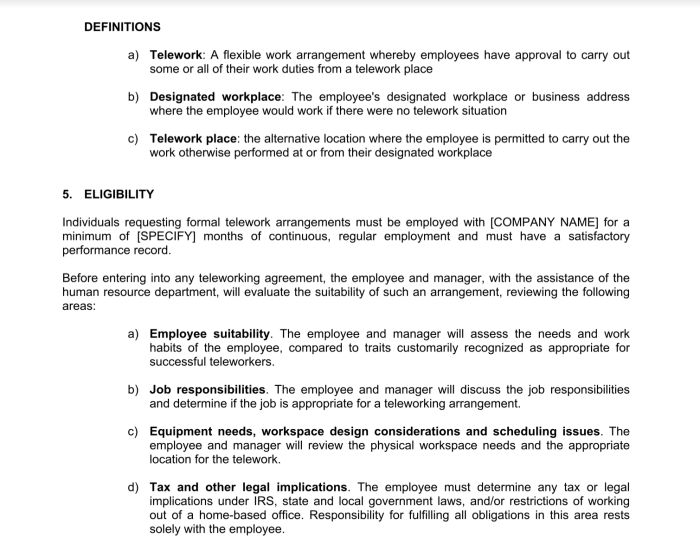Telework has emerged as a transformative trend, reshaping the modern workplace. Which statement about telework is true? This article delves into the complexities of remote work, examining its benefits, challenges, and implications for organizations and individuals.
From increased flexibility and work-life balance to potential communication barriers and isolation, telework presents a multifaceted landscape. By exploring these aspects, we aim to provide a comprehensive understanding of the true nature of telework.
Telework Adoption and Benefits: Which Statement About Telework Is True
The adoption of telework has surged across various industries due to advancements in technology and the increasing demand for flexibility and work-life balance. Telework offers numerous advantages, including increased flexibility, improved work-life balance, reduced commuting time, and cost savings for both employers and employees.
Benefits of Telework
- Flexibility: Telework enables employees to work from anywhere, at any time, allowing them to better manage their personal and professional responsibilities.
- Work-life balance: By eliminating commuting time and providing greater flexibility, telework empowers employees to achieve a better work-life balance.
- Reduced commuting time: Telework eliminates the need for daily commutes, saving employees time and reducing stress levels.
- Cost savings: Telework can lead to significant cost savings for both employers and employees, including reduced office space requirements, transportation expenses, and childcare costs.
Challenges and Considerations

While telework offers numerous benefits, it also presents several challenges that need to be addressed. These include distractions, communication barriers, and potential isolation.
Challenges of Telework
- Distractions: Working from home can lead to increased distractions, such as household chores, family members, or pets, which can impact productivity.
- Communication barriers: Telework can create communication barriers, as employees may not have the same level of access to colleagues and managers as they would in an office setting.
- Isolation: Telework can lead to feelings of isolation and loneliness, especially for employees who are accustomed to working in a collaborative environment.
Recommendations for Mitigating Challenges
- Create a dedicated workspace: Establish a specific area in the home dedicated to work to minimize distractions and create a professional atmosphere.
- Set clear communication guidelines: Establish clear communication protocols, including preferred communication methods and response times, to ensure effective communication.
- Foster a sense of community: Regularly schedule virtual team meetings, online social events, or online chat groups to maintain team cohesion and reduce feelings of isolation.
Technology and Infrastructure

Effective telework requires reliable technology and infrastructure to support remote communication, collaboration, and data security.
Essential Technology for Telework
- Stable internet connection: A high-speed and reliable internet connection is essential for effective telework, ensuring seamless communication and data transfer.
- Communication tools: Video conferencing platforms, instant messaging apps, and email systems are essential for effective communication and collaboration among remote teams.
- Collaboration platforms: Online collaboration tools, such as project management software and shared document repositories, enable remote teams to work together seamlessly.
- Security measures: Robust security measures, including firewalls, antivirus software, and data encryption, are crucial to protect sensitive data and prevent cyberattacks.
Management and Leadership
Effective management and leadership are essential for supporting successful telework environments. This involves setting clear expectations, providing regular feedback, and maintaining team cohesion in a remote setting.
Importance of Management and Leadership in Telework
- Set clear expectations: Managers must clearly communicate performance expectations, goals, and deadlines to remote employees to ensure alignment and productivity.
- Provide regular feedback: Regular feedback is crucial to guide remote employees, provide support, and identify areas for improvement.
- Maintain team cohesion: Managers must proactively foster team cohesion by organizing virtual team-building activities, encouraging open communication, and celebrating successes.
Workplace Culture and Collaboration
Telework can impact workplace culture and collaboration. It is important to foster a sense of community and teamwork among remote employees.
Impact of Telework on Workplace Culture and Collaboration
- Fostering a sense of community: Regular virtual team meetings, online social events, and shared online spaces can help create a sense of community and belonging among remote employees.
- Encouraging collaboration: Managers should encourage collaboration among remote employees by promoting the use of collaboration tools, organizing virtual brainstorming sessions, and recognizing teamwork.
- Maintaining open communication: Establishing clear communication channels and encouraging open dialogue is essential for maintaining effective collaboration in a remote setting.
Employee Experience and Well-being
Telework can have both positive and negative impacts on employee experience and well-being. It is important to promote employee engagement, satisfaction, and work-life balance in a remote setting.
Benefits of Telework for Employee Experience and Well-being
- Increased flexibility: Telework offers employees greater flexibility and autonomy, which can improve job satisfaction and work-life balance.
- Reduced stress: Eliminating commuting time and providing a more comfortable work environment can reduce stress levels for employees.
- Improved work-life balance: Telework allows employees to better manage their personal and professional responsibilities, leading to improved work-life balance.
Drawbacks of Telework for Employee Experience and Well-being, Which statement about telework is true
- Isolation: Telework can lead to feelings of isolation and loneliness, especially for employees who are accustomed to working in a collaborative environment.
- Increased workload: Some employees may experience increased workload or pressure to prove their productivity while working remotely.
- Blurred work-life boundaries: Telework can blur the boundaries between work and personal life, leading to burnout and reduced work-life balance.
Recommendations for Promoting Employee Experience and Well-being in Telework
- Establish clear work hours: Set clear work hours and encourage employees to disconnect outside of those hours to maintain work-life balance.
- Provide regular support: Managers should provide regular support to remote employees, offering emotional support, guidance, and resources to ensure their well-being.
- Foster a sense of community: Organize virtual team events, social gatherings, and online forums to create a sense of community and reduce feelings of isolation.
Legal and Regulatory Considerations

Telework raises legal and regulatory considerations related to data protection, privacy, and employment laws. It is important to ensure compliance with these regulations.
Legal and Regulatory Considerations for Telework
- Data protection: Employers must comply with data protection regulations to ensure the security and privacy of employee data processed remotely.
- Privacy: Employers must respect the privacy of employees working remotely, including their right to privacy in their home environment.
- Employment laws: Telework may impact employment laws related to working hours, overtime pay, and workplace safety, and employers must ensure compliance.
Common Queries
Is telework always beneficial for employees?
While telework offers many advantages, it can also present challenges such as isolation, communication barriers, and work-life balance issues. Therefore, its impact on employee well-being can vary depending on individual circumstances.
Does telework lead to decreased productivity?
Studies have shown that telework can actually enhance productivity by reducing distractions, improving work-life balance, and increasing employee satisfaction. However, effective management and clear expectations are crucial for maintaining productivity in remote work environments.
Is telework suitable for all types of jobs?
Telework is most suitable for jobs that require independent work and minimal face-to-face interaction. However, with the right technology and support, many types of jobs can be adapted to a remote work model.